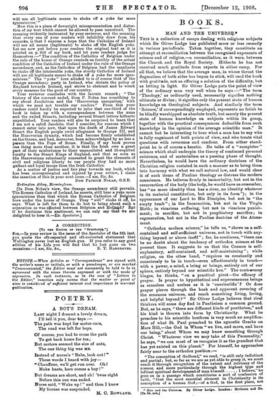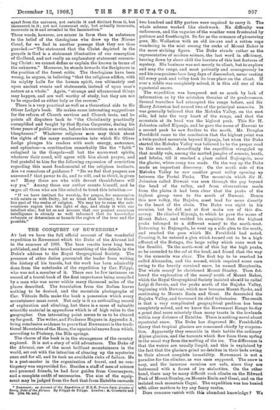BOOKS.
MAN AND THE UNIVERS4.*
THIS is a collection of essays dealing with religious subjects which Sir Oliver Lodge has published more or less recently in various periodicals. Taken together, they constitute an
attempt at reconciliation between the recognised exponents of science and of religion,—a reconciliation, as it were, between the Church and the Royal Society. Hitherto he has not received much gratitude from experts in either camp. For
all that, we believe that the average man, in whose throat the dogmatism of both sides has begun to stick, will read the book
with gratitude, not as offering a solution of the difficulty, but
as letting in light. Sir Oliver Lodge puts the point of view of the ordinary man very well when he says :—" The term Theology,' as ordinarily used, necessarily signifies nothing ultimate or divine ; it signifies only the present state of human knowledge on theological subjects. And similarly the term Science,' if correspondingly employed, represents no fetish to be blindly worshipped as absolute truth, but merely the present state of human knowledge on subjects within its grasp,
together with the practical consequences deducible from such knowledge in the opinion of the average scientific man." It cannot but be interesting to hear what a man has to say who is fully cognisant of both points of view, and who treats vital questions with reverence and candour. From either stand- point he is of course a heretic. He talks of a " completer " science which shall underpin the theory of continued personal existence, and of materialism as a passing phase of thought. Nevertheless, he would have the ordinary doctrines of the Christian religion restated in such a manner as to bring them into harmony with what we call natural law, and would clear it of such items of Pauline theology as distress the modern conscience. He believes firmly in immortality, but not in the resurrection of the body (the body, he would have us remember, has "no more identity than has a river, no identity whatever in its material constitution, but only in its form"); in the appearance of our Lord to His Disciples, but not in " the empty tomb" ; in the Incarnation, but not in the Virgin Birth ; in vicarious suffering, but not in vicarious punish- ment; in sacrifice, but not in propitiatory sacrifice ; in regeneration, but not in the Pauline doctrine of the Atone- ment.
"Orthodox modern science," be tells us, "shows us a self- contained and self-sufficient universe, not in touch with any- thing beyond or above itself " ; for, he continues, " there can be no doubt about the tendency of orthodox science at the present time. It suggests to us that the Cosmos is self- explanatory, self-contained, and self-maintaining " ; while religion, on the other hand, "requires us constantly and consciously to be in touch—even affectionately in touch— with a power, a mind, a being or beings, entirely out of our sphere, entirely beyond our scientific ken." The controversy hinges, he thinks, "on a practical pivot—the efficacy of prayer. Is prayer to hypothetical and supersensuous beings as senseless and useless as it is `unscientific' P Or does prayer pierce through the husk and apparent covering of the sensuous universe, and reach something living, loving, and helpful beyond " Sir Oliver Lodge believes that rival thinkers will some day find in Pantheism a common ground.
But, as he says, " there are different kinds of pantheism," and his kind is thrown into form by Christianity. What he preaches to his scientific brethren is very much an amplifica- tion of what St. Paul preached to the agnostic Greeks on Mars Hill,—the God in Whom " we live, and move, and have our being," about Whom we may know something through Christ. " Whatever view we may take of this Personality," he says, "we can most of us recognise it as the grandest that has yet existed on this planet." For himself, he approaches fairly near to the orthodox position
"The conception of Godhead," we read, "is still only indistinct and partial; but, so far as we are as yet able to grasp it, we must reach it through recognition of the extent and intricacy of the cosmos, and more particularly through the highest type and loftiest spiritual development of man himself I believe," he goes on in a passage which constitutes a sort of confession of faith, "that the most essential element in Christianity is its conception of a human God ;—of a God, in the first place, not • Man and the Universe. By Oliver Lodge, London Methuen and Co. Re. 6d. net.I
apart from the universe, not outside it and distinct from it, but immanent in it; yet not immanent only, but actually incarnate, incarnate in it and revealed in the Incarnation."
These words, however, are nearer in form than in substance to the belief of the theologians who drew np the Nicene Creed, for we find in another passage that they are thus guarded :—" The statement that the Christ depicted in the gospels is God is a statement illustrative of our conception of Godhead, and not really an explanatory statement concern- ing Christ : we cannot define or explain the known in terms of the unknown." Moreover, he stands towards the Scriptures in the position of the freest critic. The theologians have been wrong, he argues, in believing "that the religious edifice, with its mighty halls for the human spirit, can ultimately rest upon ancient events and statements, instead of upon man's nature as a whole." Again, "strange and ultranormal things may happen, and are welt worthy of study, but they are not to be regarded as either holy or the reverse."
There is a very practical as well as a theoretical side to Sir Oliver Lodge's book. He makes some interesting suggestions for the reform of Church services and Church tests, and be points all disputers back to "the Christianity practically exemplified and taught by that Syrian Carpenter, during his three years of public service, before his execution as a criminal
blasphemer." Whatever religious men may think about
the rights of the many controversies into which Sir Oliver Lodge plunges his readers with such energy, assurance, and optimism—a combination remarkably like the " faith " eulogised in the Gospels—all but the narrowest spirits, whatever their creed, will agree with him about prayer, and feel grateful to him for the following expression of conviction regarding this most fundamental of the religious instincts. Are we conscious of guidance ? "Do we feel that prayers are answered ? that power to do, and to will, and to think, is given us ? Many there are who with devout thankfulness will say yes." Among these our author counts himself, and he urges all those who are like-minded to trust this intuition :- "If we have instinct for worship, for prayer, for communion with saints or with Deity, let us trust that instinct; for there lies part of the realm of religion. We may try to raise the sub- conscious region into the light of day, and study it with our intellect also; but let us not assume that our preseut conscious intelligence is already so well informed that its knowledge exhausts or determines or bounds the region of the true and the possible."































































 Previous page
Previous page